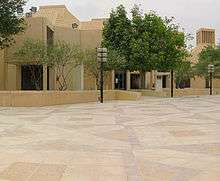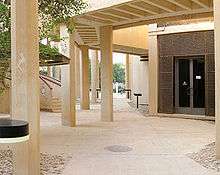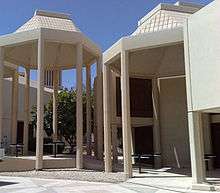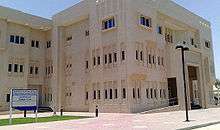Qatar University
| جامعة قطر | |
|
Qatar University | |
Former names | University of Qatar |
|---|---|
| Type | Public |
| Established | 1973 |
| President | Hassan Rashid Al-Derham [1] |
Academic staff | >800 |
| Undergraduates | >1500 |
| Location |
Doha, Qatar 25°22′30″N 51°29′20″E / 25.37500°N 51.48889°ECoordinates: 25°22′30″N 51°29′20″E / 25.37500°N 51.48889°E |
| Campus |
Urban 2,000 acres (8.1 km2) |
| Language | Arabic and English |
| Publications |
Campus Life (English) |
| Affiliations |
Union of Arab Universities League of Islamic Universities International Association of Universities |
| Website | qu.edu.qa |
|
| |
Qatar University (Arabic: جامعة قطر; transliterated: Jami'at Qatar) is a public university in Qatar, located on the northern outskirts of the capital Doha. As of 2014, there are over 16,000 students. Courses are taught in Arabic (in education, arts and social sciences courses) or English (in natural sciences, engineering and business courses). The university is the only government university in the country.[2] The university hosts seven colleges – Arts and Sciences, Business and Economics, Education, Engineering, Law, Sharia and Islamic Studies, and a College of Pharmacy – with a total of almost 8000 students at a 13:1 student-teacher ratio.
Students entering the university are placed in a “Foundation Program”, which ensures the acquirement of skills such as math, English, and computer technology.[3]
Many of its academic departments have received or are currently under evaluation for accreditation from a number of organizations.[4] In addition to undergraduate academics, QU has a research infrastructure including research labs, an ocean vessel, technical equipment and a library housing thousands of books, including a collection of rare manuscripts.
The university serves on behalf of the government and private industry to conduct regional research, particularly in areas of the environment and energy technologies. Qatar University has a student body of fifty-two nationalities, 65% of which are Qatari nationals. About 35% are children of expats.[5] Women make up approximately 70% of the student population, and are provided their own set of facilities and classrooms.[6] QU has an alumni body of over 30,000 graduates.[3]
History

The institution was established as the College of Education by a decree from the Emir of Qatar in 1973. The college began with a total of 150 students (93 women and 57 men) and was later expanded to become the University of Qatar in 1977 with four new colleges : Education, Humanities & Social Sciences, Sharia & Law & Islamic Studies, and Science.
Three years later, the College of Engineering was established. By then, the number of enrolled students was 2,600. This was followed by the establishment of the College of Business & Economics in 1985. The new colleges prompted a large expansion of the university campus, which was overseen by Aga Khan Award for Architecture recipient Kamal El Kafrawi.[7] By Fall Semester 2005 / 2006, the number of registrants for study at Qatar University had reached 7660 male and female students, equaling almost 1/6 of the eligible Qatari population.[8]
As of 2011, there are seven colleges: College of Education, College of Arts and Sciences, College of Shariah and Islamic Studies, College of Engineering, College of Law, College of Business & Economics, and College of Pharmacy. The new College of Pharmacy was established in 2006, with its first intake of BSc (Pharm) students in 2007.
Between 2003 and 2015, the president of the university was Sheikha Abdulla Al-Misnad. She left in 2015. Her replacement was Hassan Rashid Al-Derham, who currently holds the position, and is the university’s sixth president. Al-Derham received his doctoral degree from the University of South Wales (United Kingdom).[1]
In December 2015, the university awarded its first-ever honorary doctorate degree to Turkish president Recep Tayyip Erdoğan.[9]
Reform Project (2003–2007)
The Qatar University Reform project evaluated and restructured the university administration and direction to enhance the quality of instruction and place emphasis on research.[10] The reform was initiated in 2003, led by His Highness Sheikh Tamim Bin Hamad Al-Thani, QU President Dr. Sheikha Al Misnad, and the newly established Office of Institutional Research and Planning (OIPD).[11] It focused on three principles; “Autonomy”, “Decentralization”, and “Accountability”.[12] While the university had previously operated as a government entity, the reformed institution would be an autonomous body governed by a board of regents who reported to the Emir. This change allowed the University to manage its own finances, stated objectives and vision, and personnel and decentralization within the university granted similar financial and personnel control to colleges, departments and programs.[12]
Academically, the reform resulted in the establishment of offices such as the Student Learning Support Center (SLSC) and Student Counseling Center (SCC). Construction was undertaken to ensure accessibility of university facilities by handicapped persons. A newsletter, Tawasol, began publication in the university[13]
The reform changed the title of the university from “University of Qatar” to “Qatar University” with a new slogan; “Qatar University, Changing for You” and a new university logo.[14]
Local significance and interaction

The university contributes to the process of “Qatarization”, which places an emphasis on the hiring and support of national citizens. While western nations may have trouble implementing such a system due to equality legislation, Qatari nationals only account for approximately 1/4 of the country’s population, and this movement is deemed necessary to maintain cultural and national identity.[15][16]
World view and influence
Qatari leaders have recognized the fallibility of oil and natural gases as a long-term economic model, especially for a smaller area such as Qatar.[17]
The university has directed funding towards contributions to international projects. This has included taking part in global environmental studies through regional measurements, promotion of energy-awareness, and the recent contribution to CERNE of data gathered through the university’s new positron beam.[18]
Since graduate programs are not available in many fields, Qatar University often works closely with a network of international affiliate schools. Students who have shown exceptional potential or progress can often receive sponsorship from the University for graduate studies abroad, on the condition that they will return to work once finished.
Construction
Qatar University is situated on the northern edge of Doha, approximately 16 kilometers from the city center. Due to the growth of the city, this area has recently become more valuable, and a popular development site for upscale residential and commercial buildings. QU has agreed to lease a portion of its property to the construction of new commercial zones to the north and east, as well as a substantial plot for the College of the North Atlantic to the south.[19]
A QAR 20 million Scientific and Applied Research Center is under construction to advance the University’s research efforts and abilities.[20]
Colleges and Departments
College of Arts and Sciences

The College of Arts and Sciences was established in 2004 through the merging of two former colleges; the College of Humanities and Social Sciences, and the College of Science. It is the largest college by both number of programs and student population at Qatar University, with a total of 2,383 students; 1,933 Arts majors and 450 Science majors. This reflects approximately 37% of the student body. The College has 240 faculty members, including Dean Dr. Kassim Ali Shaaban.[21]
Departments:[22]
- Department of Arabic Language
- History
- Department of Biological & Environmental Sciences
- Biological Science
- Emvironmental Science
- Department of Chemistry & Earth Sciences
- Department of English Literature and Linguistics
- Department of Health Sciences
- Biomedical Program accredited by the NAACLS
- Human Nutrition Program
- Department of Humanities
- Department of Mass Communication & Information Science
- Mass Communication Program
- Department of Mathematics, Statistics & Physics
- Department of Social Sciences
- Social Work
- Psychology
- Sociology
- International Affairs
- Policy, Planning and Development
- Statistics
- Sport Science
Programs:
- Arabic for Non-Native Speakers Program
College of Business & Economics

Founded in 1985, it has begun work on a new QR 185 million facility to accommodate its student body and provide resources.[24] Dr. Nitham M. Hindi was appointed as Dean in August 2010.[25]
Departments:
- Accounting and Information Systems
- Finance and Economics
- Management and Marketing
- Marketing
- The College is accredited by the Association to Advance Collegiate Schools of Business (AACSB).[26] An MBA degree program is available for graduate students, as well as a CPA testing program.
College of Education

The College of Education was the primary academic body under which Qatar University was founded in 1973.[27] The dean is Dr. Hissa Sadiq.
Departments:
- Educational Sciences
- Psychological Sciences
- Art Education
College of Engineering

The College of Engineering was established in 1980, and has become one of the largest at Qatar University.[28] The College’s previous Dean, Dr. Alfadala, was also the founder and former Chairman of the University’s Gas Processing Center (GPC) research facility.[29] The current Dean is Dr. Khalifa Al-Khalifa.[28]
Departments:[30]
- Architectural Engineering
- Chemical Engineering
- (ABET Substantial Equivalency accredited)
- Civil Engineering
- (ABET Substantial Equivalency accredited)
- Computer Engineering
- (ABET Substantial Equivalency accredited)
- Computer Science
- (ABET Substantial Equivalency accredited)
- Electrical Engineering
- (ABET Substantial Equivalency accredited)
- Mechanical Engineering
- (ABET Substantial Equivalency accredited)
- Industrial Engineering
College of Law

In 2004, Qatar University instated a College of Law by separating the law department of the existing College of Sharia. 45% of its graduate program is instructed in English. In 2008, it asked the ABA to conduct a full-scale, on-site evaluation of all aspects of the school’s objectives, programs, and administration.[31] Hassan Abdelrahim Okour was appointed dean in August 2010.
Programs:
- Undergraduate Law
College of Pharmacy
The College of Pharmacy at Qatar University was founded as a college in 2008. It is the first pharmacy college to be established in Qatar. It began as a program in 2006, and saw its first student intake in 2007. 2008 also marked the college’s accreditation by the CCAPP (Canada), and became the first international pharmacy program to receive accreditation by that organization.[32][33] Peter Jewesson has been the College Dean since its inception, and had also been the director of the previous Pharmacy program.
The College of Pharmacy offers three degrees:[34]
- 5-year program Bachelor of Science in Pharmacy – BSc (Pharm)
- Accredited by CCAPP
- 6-year Doctor of Pharmacy - PharmD
- The PharmD degree is targeted for select graduates pursuing advanced clinical training. It is offered as a full-time study plan for QU graduates, and a part-time study plan for BSc (Pharm) pharmacists practicing in Qatar
- 2-year Master of Science in Pharmacy - MSc (Pharm)
- The MSc (Pharm) degree is designed to build on the undergraduate degree experience.
College of Sharia and Islamic Studies

College of Sharia and Islamic Studies was among the first founded at Qatar University when it was established in 1977. In recent years, it added new major and minor programs in subjects such as “Da’wa and Media” and “Banking and Insurance”.[35] Dr. Aisha Yousuf Al-Mannai is the current dean.
Departments:
- Islamic Jurisprudence
- Islamic Culture & Preaching
- Foundations of Islam
College of Medicine
in December 2014, Qatar University announced the establishment of the College of Medicine which is planned to take the 1st batch in by Fall 2015 (September) and graduate them by 2021.[36]
Sport Science Program
The Sport Science Program was opened to students in the fall 2009 semester. The program was constructed as a joint project sponsored by Aspire Academy.[37] While QU's Sport Science program is not an independent college, it has been formed with autonomy from the other colleges, much as the College of Pharmacy began.
The Program offers a Bachelor of Science degree which allows for one of 3 concentrations:
- Sport Management
- Exercise and Fitness
- Physical Education
Honors Program
Qatar University's Honors Program was established in 2009. to provide academic opportunities for high-achieving students. Students in the program complete 24 credit hours of honors courses, as part of the 120 credit hours necessary for their undergraduate program. Students must graduate with an overall GPA of 3.5 or above, with a minimum score of 3.0 in all honors courses.[38] Qatar University holds strict requirements for students wishing to apply:[39]
- Minimum of 90% or higher in high school certificate or an equivalent certificate (current QU students must complete 12 to 18 post-foundation credit hours with a 3.5 GPA)
- Minimum score of 500 on the TOEFL exam or 5.5 on the ILETS
- Minimum score of 550 in the Math portion of SAT, 24 on the ACT
- Two letters of recommendation from current or previous instructors, counselors or academic advisers
- Copy of transcript
- A written essay
- Pass an interview
In addition to academic advisers, Honors students are assigned an adviser to assist with honors issues and other consultation.[40] For courses which are not offered as Honors, students may propose an "Honors Contract" to specify honors-level objectives and goals to be monitored by a sponsoring professor.[41]
Controversy
Specially Designated Global Terrorist (SDGT) Abd Al-Rahman al-Nuaimi was a history professor at Qatar University until 2009.[42] Al-Nuaimi was reportedly arrested for opposing co-education at Qatari universities in 2009.[43]
The former Qatar University professor was designated a SDGT by the U.S. Department of the Treasury for "ordering the transfer of nearly $600,000 to al-Qaeda via al-Qaeda’s representative in Syria", overseeing "the transfer of over $2 million per month to al-Qaeda in Iraq for a period of time", and providing financial support to al-Shabaab figures.[44]
In September 2015, Qatar University and the Association of American Colleges and Universities (AAC&U) signed a partnership agreement.[45] In reference to the partnership, AAC&U President Carol Geary Schneider said that "AAC&U and Qatar University bring together educators who share a passion for general education and a commitment to help all students achieve both broad learning about the world they will inherit – through studies in science, humanities, the arts, and the social sciences – and the critical skills they need to help create solutions for our future."[46]
However, partnerships between Qatari and American universities have come under criticism in recent years. [47] Many view Qatar, a state often accused of limiting academic freedom and financially supporting Hamas, as an unfit partner for U.S. institutions.[48][49] AAC&U was the first partnership between a U.S.-based academic association and Qatar University, Qatar’s first and only public university.
References
- 1 2 Josh Aden (18 June 2015). "Hassan Rashid Al-Derham named Qatar University president". Gulf News Journal. Retrieved 6 September 2015.
- ↑ Joy S. Moini, Tora K. Bikson, C. Richard Neu, Laura DeSisto (2009). "The Reform of Qatar University". RAND Corporation. Retrieved 6 September 2015.
- 1 2 "President's Welcome Message". Qatar University. Retrieved 6 September 2015.
- ↑ "International Accreditation". Qatar University. Archived from the original on 6 September 2015.
- ↑ "Interview with Qatar University's President Sheikha Abdulla AMisnad". Investvine. 20 January 2013. Retrieved 21 January 2013.
- ↑ "QU Statistics". Qatar University. Archived from the original on 6 September 2015.
- ↑ Project summary of Qatar University Archived January 5, 2009, at the Wayback Machine.
- ↑ "Our Students". Qatar University. Retrieved 6 September 2015.
- ↑ "Turkey's President Erdogan receives honorary degree from Qatar". Al Arabiya. 3 December 2015. Retrieved 3 December 2015.
- ↑ "Why Reform?". Qatar University. Retrieved 6 September 2015.
- ↑ "The Reform Project". Qatar University. Archived from the original on 6 September 2015.
- 1 2 "The Reform Plan". Qatar University. Retrieved 6 September 2015.
- ↑ "Student Impact of the Reform Plan". Qatar University. Retrieved 6 September 2015.
- ↑ "Tawasol". Qatar University. Retrieved 6 September 2015.
- ↑ "What is Qatarization?". qatarization.com.qa. Retrieved 6 September 2015.
- ↑ "U.S. Relations With Qatar". U.S. Department of State. 26 August 2014. Retrieved 6 September 2015.
- ↑ "Gas Processing Center - About Us". Qatar University. Archived from the original on 6 September 2015.
- ↑ "Dedication of The Positron Beam to Qatar". ilhamalqaradawi.com. Archived from the original on 6 September 2015.
- ↑ "Our Campus". Qatar University. Retrieved 6 September 2015.
- ↑ "Qatar University launches $200m expansion". MENAFN. 9 June 2008. Retrieved 6 September 2015.
- ↑ "About CAS". Qatar University. Retrieved 6 September 2015.
- ↑ "College of Arts & Sciences departments". Qatar University. Retrieved 6 September 2015.
- ↑ "College of Arts & Sciences accreditation". Qatar University. Retrieved 6 September 2015.
- ↑ QU 2008/2009 Brochure
- ↑ "Professor Nitham M. Hindi". Qatar University. Retrieved 6 September 2015.
- ↑ "College of Business & Economics". Qatar University. Retrieved 6 September 2015.
- ↑ "College of Education". Qatar University. Retrieved 6 September 2015.
- 1 2 "College of Engineering". Qatar University. Retrieved 6 September 2015.
- ↑ "Gas Processing Center home page". Qatar University.
- ↑ "College of Engineering ABET accreditation". Qatar University. Retrieved 6 September 2015.
- ↑ "Historical Development of Law Program at Qatar University". Qatar University. Archived from the original on 6 September 2015.
- ↑ "College of Pharmacy". Qatar University. Retrieved 6 September 2015.
- ↑ "College of Pharmacy - About Us". Qatar University. Retrieved 6 September 2015.
- ↑ "College of Pharmacy accreditation". Qatar University. Archived from the original on 6 September 2015.
- ↑ "College of Sharia". Qatar University. Archived from the original on 6 September 2015.
- ↑ "Qatar University announces admission requirements for new College of Medicine". qatarisbooming.com. Retrieved 2015-08-10.
- ↑ "Sport Science Program". Qatar University. Retrieved 6 September 2015.
- ↑ "Honors program". Qatar University. Retrieved 6 September 2015.
- ↑ "Honors program - Admission criteria & forms". Qatar University. Archived from the original on 6 September 2015.
- ↑ "Honors program - Student advising". Qatar University. Archived from the original on 6 September 2015.
- ↑ "Honors program - Honors contract". Qatar University. Archived from the original on 6 September 2015.
- ↑ http://gulfnews.com/news/gulf/qatar/al-nuaimi-was-promoting-brotherhood-ideals-1.1268824
- ↑ http://www.thedailybeast.com/articles/2013/12/20/terrorists-for-human-rights.html
- ↑ https://www.treasury.gov/press-center/press-releases/Pages/jl2249.aspx
- ↑ https://www.aacu.org/press/press-releases/qatar-university
- ↑ https://www.aacu.org/press/press-releases/qatar-university
- ↑ http://gulfnewsjournal.com/stories/510548507-roots-of-american-universities-grow-deeper-in-qatar-drawing-criticism
- ↑ https://www.washingtonpost.com/news/grade-point/wp/2015/12/17/northwestern-professor-raises-questions-about-its-branch-in-qatar/
- ↑ http://www.haaretz.com/middle-east-news/1.734976
External links
- Official website (English)
- Official website (Arabic)
.png)